/regions/western-coastal-plains
Western Coastal Plains
Hamirsarno Saad -
Posted on 14 Jun, 2011 11:43 PMGujarati newsletter brought out by ACT Kutch, for admirers of the Hamirsar lake and its environs
Taking action in India on downstream impact of dams - Report of the workshop held by International Rivers and Save Western Ghats Movement at Jog Falls, Karnataka in May 2011
Posted on 14 Jun, 2011 05:17 PM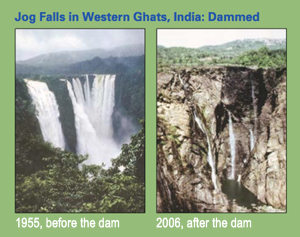 Jog falls in Western Ghats
Jog falls in Western Ghats
These dams have had a profound negative impact on communities and ecology upstream and downstream. While promised benefits of these dams (irrigation, hydro-power or flood control) have been overstated, numerous interrelated and complex negative impacts have simply not been studied or documented. Nonetheless, communities and ecosystems continue paying huge prices of these impacts.
Interlinking of water harvesting structures through link water channels - A viable alternative at micro-level by Ambuja Cement Foundation
Posted on 25 May, 2011 07:39 PM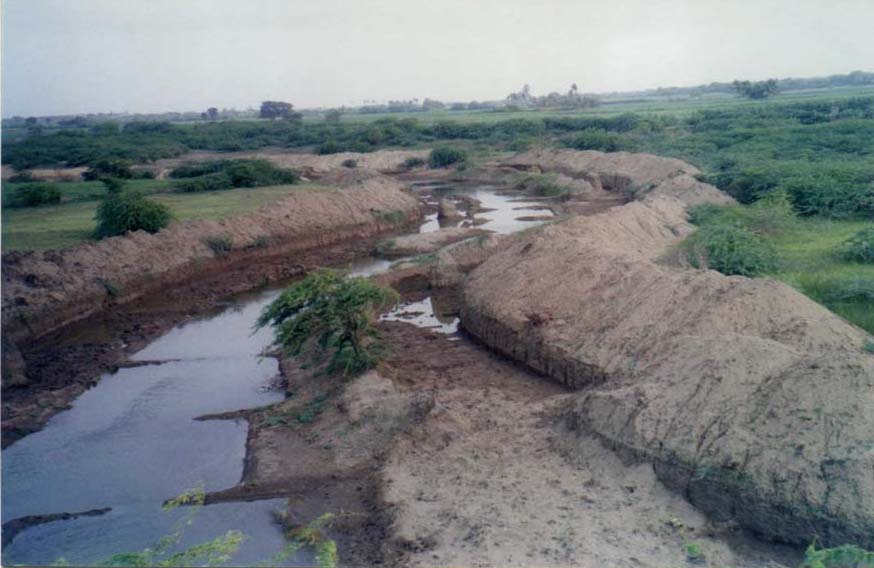 The coastal areas of Gujarat especially the villages lying within 20-25 km from the seashore are suffering from the problem of salinity ingress. Most of the rivulets that drain this region like Goma and Somat are seasonal at best and their water does not last beyond monsoons. The other aquifers like ponds, which get water from these rivers, also dry up as early as October.
The coastal areas of Gujarat especially the villages lying within 20-25 km from the seashore are suffering from the problem of salinity ingress. Most of the rivulets that drain this region like Goma and Somat are seasonal at best and their water does not last beyond monsoons. The other aquifers like ponds, which get water from these rivers, also dry up as early as October.
Planning for vulnerability - The hazards and setbacks in coastal legislation – A report by Dakshin Foundation
Posted on 22 May, 2011 06:16 PM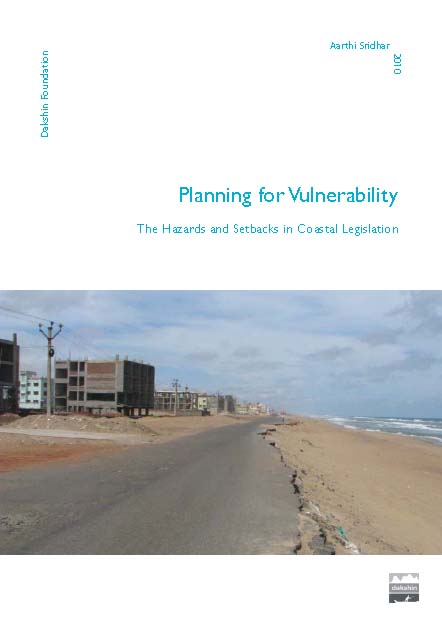 The law pertaining to coastal spaces – the Coastal Regulation Zone (CRZ) Notification, 1991 specifically decides what people can and cannot do on the coastal stretches of the country.
The law pertaining to coastal spaces – the Coastal Regulation Zone (CRZ) Notification, 1991 specifically decides what people can and cannot do on the coastal stretches of the country.
Harbouring trouble - The social and environmental upshot of port growth in India – A report by Dakshin Foundation
Posted on 22 May, 2011 12:04 PMBesides its own impact, port development is often accompanied by other activities such as the location of industries, power plants, railway lines, highways, hotels, SEZs, residential complexes, etc., that have multiple detrimental impacts – environmental, social and erosion related.
Claims for survival - Coastal land rights of fishing communities – A report by Dakshin Foundation
Posted on 22 May, 2011 09:25 AM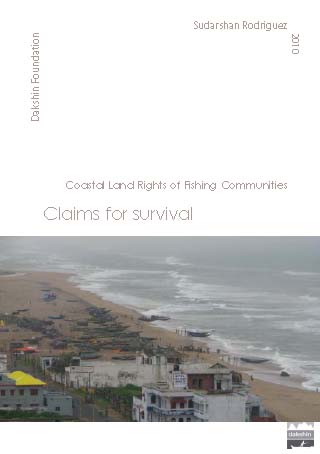 Marine-coastal ecosystems and coastal communities are poorly represented in the public debates on India’s social and environmental problems. Coastal and marine ecosystems are the backbone of a fisheries economy that supports livelihoods of millions directly and several more indirectly.
Marine-coastal ecosystems and coastal communities are poorly represented in the public debates on India’s social and environmental problems. Coastal and marine ecosystems are the backbone of a fisheries economy that supports livelihoods of millions directly and several more indirectly.
Community groups such as fishers and other coastal populations enjoyed customary or traditional rights to exploit resources and to fish in adjacent coastal areas. The current state of fisheries finds its genesis in the modernization programme introduced by the Government of India to ‘develop’ the sector with the focus for development through the maximisation of production. In the late 1970s, modern fishing methods threatened the livelihoods of these communities and coastal ecosystems. Mechanised craft and gear, principally trawlers with bottom trawling gear, severely impacted fishing stocks.
Fisherfolk in India have struggled for greater control over the seas and resource management, struggles which have been directed both inward as well as against the State. The conflict over the coastal space is mostly between fishing communities and other new users and interest groups. Access to coastal resources is now being thrown open to all, giving a new meaning to the idea of ‘coastal commons’. There are very clear linkages between the rights to the coast and the right to fish as without the former, the latter will be difficult to operationalise and eventually rendered meaningless.
The Coastal Regulation Zone (CRZ) Notification, 1991 has been the only legislation with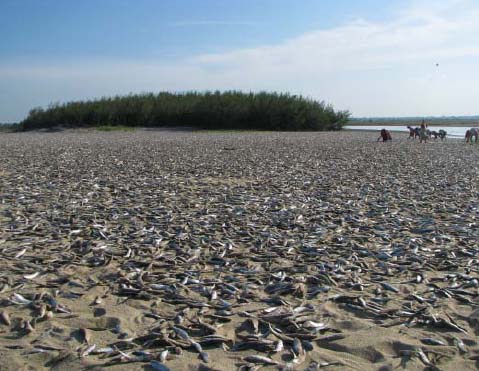 some mention and reference to customary rights of fishing communities on land in the coastal zone. However, it did not contain provisions and details to ascertain or establish these rights. Despite this, fishing communities have seen the CRZ in its 1991 form as an instrument in their favour as it regulates all activities that can potentially impact the coast and community livelihoods. However, the twenty one odd amendments to the CRZ Notification were mostly in favour of development pressures and special interest lobbies.
some mention and reference to customary rights of fishing communities on land in the coastal zone. However, it did not contain provisions and details to ascertain or establish these rights. Despite this, fishing communities have seen the CRZ in its 1991 form as an instrument in their favour as it regulates all activities that can potentially impact the coast and community livelihoods. However, the twenty one odd amendments to the CRZ Notification were mostly in favour of development pressures and special interest lobbies.
This backdrop forms the driving force behind this report which seeks to argue a case for according coastal land rights to fishing communities.
Inviting endorsements on a submission to the WGEEP for declaring the rivers in the Western Ghats as Ecologically Sensitive Areas (ESAs)
Posted on 22 Apr, 2011 12:58 PMDear friends,
We are all aware of the immense ecological, cultural and social significance of rivers originating and flowing through the Western Ghats. This includes source regions of East flowing rivers like Krishna, Godavari and Cauvery and the source, riparian and estuarine region of all West flowing rivers.
We are lucky to still have some of the very few and very rare 'free flowing rivers' in the country. Most of the rivers in our country have been dammed and diverted. This has changed the ecological and physical characteristics of these rivers completely. Today, it is difficult for us to visualise the amazing range of ecological goods and services that an undammed, free flowing river can provide. Some such rivers in the Western Ghats are Shastri, Aghanashini, Gargai and Seetha Nadi.
Strain on the marine aquatic environmental quality around Mumbai, owing to indiscriminate release of wastewater – Research reports from the National Institute of Oceanography
Posted on 10 Apr, 2011 07:21 PMThe first report titled “Heavy metal burden in coastal marine sediments of north west coast of India in relation to pollution” by M A Rokade, University of Mumbai uses the data on contaminants including metals in seawater, marine sediments and biota for the Mumbai- Bassein region, a high
Preparedness for tsunami-like disasters - MoEF Press release
Posted on 18 Mar, 2011 01:07 PM
In the background of recent Tsunami tragedy that has struck Japan,concern has been raised in India on the safety of critical infrastructure projects located in the coastal areas, for instance, power plants, oil storage depots, refineries etc. More such projects are likely to come up in the coastal locations in the years to come.
Hazard Line Mapping
In this connection, it may be recalled that a very important component of the Rs.1200 crore project taken up by the MoEF for implementation involves identification, delineation and demarcation of the hazard line along the 5400 kms of the main coastline of India.
Coastal Regulation Zone Notification 2011: Not the end of the road - An EPW paper
Posted on 01 Mar, 2011 11:59 AMIt falls short of offering greater protection to the coastal ecosystem, recognising the inalienable right of fisherfolk to their habitats and providing them with representation in decision-making.